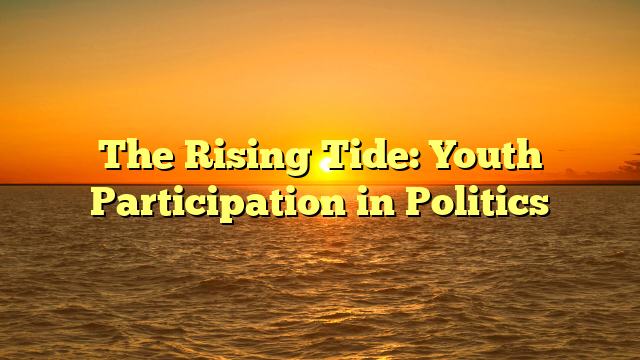In recent years, a significant shift has emerged in global politics: the increasing involvement of young people in political processes. From climate strikes led by teenagers to first-time voters influencing election outcomes, youth participation is becoming a powerful force reshaping political landscapes worldwide.
The Power of the Youth Voice
Historically, politics has often been perceived as a domain dominated by older generations. Young people, while frequently passionate about social issues, have long been underrepresented in formal political systems. However, this trend is gradually changing. With the rise of social media, online activism, and a growing sense of urgency around issues like climate change, economic inequality, and human rights, the younger generation is demanding to be heard.
This shift is not just anecdotal. According to a 2024 study by the International Institute for Democracy and Electoral Assistance (IDEA), youth voter turnout increased in over 40% of democratic nations compared to the previous decade. Movements such as Fridays for Future, Black Lives Matter, and pro-democracy protests across Asia and Latin America have shown that young people are not only politically aware but also deeply engaged.
Why Youth Participation Matters
Youth engagement in politics is vital for several reasons. Firstly, it ensures that policies reflect the needs and aspirations of future generations. Issues like climate policy, education reform, and technology regulation directly impact young people and their futures. When they are part of the decision-making process, policies are more likely to be forward-thinking and inclusive.
Secondly, involving youth in politics revitalizes democracy. It brings fresh ideas, new perspectives, and challenges to the status quo. Many young politicians and activists today are leveraging digital tools to engage with constituents, promote transparency, and drive grassroots change in ways traditional politics has often failed to do.
Finally, early political involvement fosters lifelong civic responsibility. Studies show that people who participate in politics at a young age are more likely to remain engaged throughout their lives—voting, advocating for change, or even running for office.
Challenges to Youth Engagement
Despite the positive trends, barriers still exist. Many young people feel disillusioned with traditional politics, viewing it as corrupt, slow, or unresponsive. Political education in schools is often lacking, leaving students without a strong understanding of how systems work or how to get involved. Additionally, structural barriers such as minimum age requirements, lack of representation, and economic constraints can prevent youth from taking part in formal political roles.
Moreover, in some countries, authoritarian governments suppress youth activism through censorship, intimidation, or violence. Even in democracies, young activists often face online harassment, legal challenges, or marginalization in political discourse.
The Role of Technology and Social Media
One of the most significant tools in the hands of politically active youth is technology. Platforms like Twitter, TikTok, and Instagram have become central to modern political engagement. pptoto slot allow young people to share information, mobilize support, and hold leaders accountable in real time. Hashtags become rallying cries, viral videos raise awareness, and digital petitions bring pressure to governments.
However, this digital power comes with responsibility. Misinformation, online radicalization, and echo chambers can distort political dialogue. Educating youth about digital literacy is crucial to ensure that technology empowers rather than misleads.
Looking Ahead
As the world grapples with complex challenges—climate change, technological disruption, global inequality—the inclusion of young voices in politics is more important than ever. Governments, educators, and civil society must work together to remove barriers, build trust, and create pathways for youth engagement.
Political parties should actively recruit young candidates and listen to youth perspectives. Schools should prioritize civic education that encourages critical thinking and political participation. And most importantly, young people themselves must continue to speak up, vote, organize, and lead.
The future of democracy depends not just on the old guard but on the energy, creativity, and courage of the next generation. The rise of youth in politics isn’t just a trend—it’s a transformation.
The Rising Tide: Youth Participation in Politics



